Dear readers! In 1897, Mirza Ghulam Ahmad Qadiani, in response to an advertisement by Maulana Ghulam Dastgir Qasoori, clearly defined his revelation, stating:
“Let it be clear to them that we too curse anyone who falsely claims prophethood, and we affirm ‘Lā ilāha illallāh Muhammadur Rasūlullāh’ and believe in the finality of Prophet Muhammad’s (صلی اللہ علیہ وسلم) prophethood. We do not claim revelation of prophethood (wahy-e-nubuwwat) but rather revelation of sainthood (wahy-e-wilayat), which is received by the saints under the shadow of the prophethood of Muhammad (صلی اللہ علیہ وسلم) and in his following. Anyone who accuses us of anything beyond this has abandoned piety and honesty. If someone becomes a disbeliever due to divine inspirations from the Quran, then they must first declare Sayyid Abdul Qadir Jilani (رضی اللہ عنہ) a disbeliever, for he also claimed divine inspirations from the Quran. In any case, we do not claim prophethood but only sainthood and being a Mujaddid (reformer).”
(Majmua Ishtiharat, Vol. 2, p. 2 – Advertisement titled “Reply to Maulana Ghulam Dastgir Sahib’s Advertisement,” new edition)
Now, you decide for yourselves: Mirza Sahib has clearly described the nature of his revelation, stating that it is not prophetic revelation but that of sainthood and reform. If we do not call this statement of his a lie, then what should we call it?
Let us move further. Mirza Qadiani, in his book Barahin-e-Ahmadiyya, presented revelations containing the words Nabi (Prophet) and Rasul (Messenger) as proof of his prophethood and messengership. He writes:
“The truth is that the divine revelations sent to me contain words such as ‘Rasul,’ ‘Mursal,’ and ‘Nabi’—not just once but hundreds of times. So how can anyone say that such words do not exist? In fact, compared to earlier times, these words are now present with even greater clarity. Even in Barahin-e-Ahmadiyya, published 22 years ago, these words are not few. For example, one of the divine revelations published in Barahin-e-Ahmadiyya is:
هُوَ الَّذِي أَرْسَلَ رَسُولَهُ بِالْهُدَىٰ وَدِينِ الْحَقِّ لِيُظْهِرَهُ عَلَى الدِّينِ كُلِّهِ
(See Barahin-e-Ahmadiyya, p. 498)
Here, I am clearly called a ‘Rasul.’ Later, in the same book, another revelation states:
جَرَى اللّٰهُ فِي حُلَلِ الْأَنْبِيَاءِ
(See Barahin-e-Ahmadiyya, p. 504)
Meaning, ‘Allah’s Messenger walks in the garments of the prophets.’ Then, near this dialogue, another revelation says:
مُحَمَّدٌ رَّسُولُ اللّٰهِ وَالَّذِينَ مَعَهُ أَشِدَّاءُ عَلَى الْكُفَّارِ رُحَمَاءُ بَيْنَهُمْ
(See Barahin-e-Ahmadiyya, p. 557)
In this divine revelation, my name is given as ‘Muhammad,’ and I am also called ‘Rasul.’ Another revelation states:
دُنْيَا مَعَ نَذِيرٌ آتٍ
(“A warner has come to the world”)
An alternative recitation is: دُنْيَا مَعَ نَبِيٌّ آتٍ
(“A prophet has come to the world”).
Similarly, in several other places in Barahin-e-Ahmadiyya, I have been referred to as ‘Rasul.’”
(Ek Ghalti Ka Izala, Ruhani Khazain, Vol. 18, pp. 206-207)

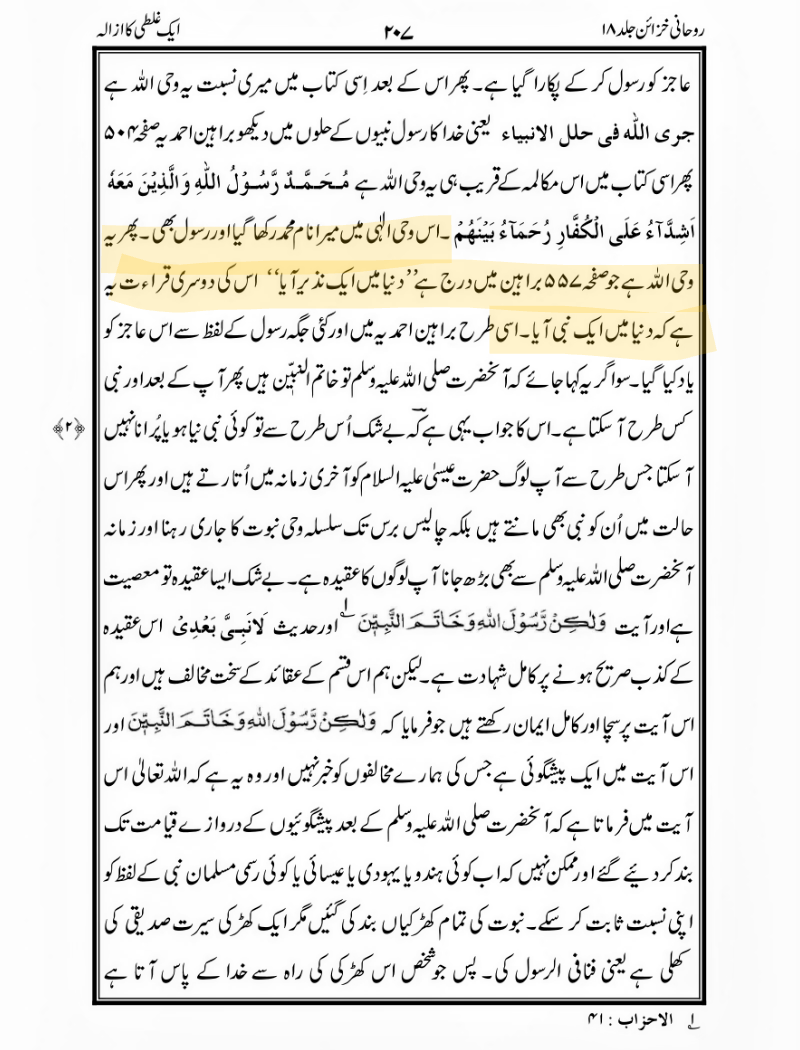
Dear readers! Let us now examine what Mirza Qadiani’s stance was when he recorded these revelations in Barahin-e-Ahmadiyya.
On page 499 of Barahin-e-Ahmadiyya, regarding the revelation هُوَ الَّذِي أَرْسَلَ رَسُولَهُ بِالْهُدَىٰ وَدِينِ الْحَقِّ لِيُظْهِرَهُ عَلَى الدِّينِ كُلِّهِ, Mirza Qadiani writes:
“This verse is a prophecy regarding the physical and political dominance of Hazrat Isa (علیہ السلام). The complete dominance of Islam, as promised, will be achieved through Hazrat Isa (علیہ السلام). When Hazrat Isa (علیہ السلام) returns to this world, Islam will spread across all regions through him. However, it has been revealed to me that due to my humility, reliance on Allah, and the signs and lights bestowed upon me, I am a reflection of Hazrat Isa’s first life. My nature and his are extremely similar, as if we are two pieces of the same gem or two fruits of the same tree.”
(Barahin-e-Ahmadiyya, Vol. 1, p. 593)
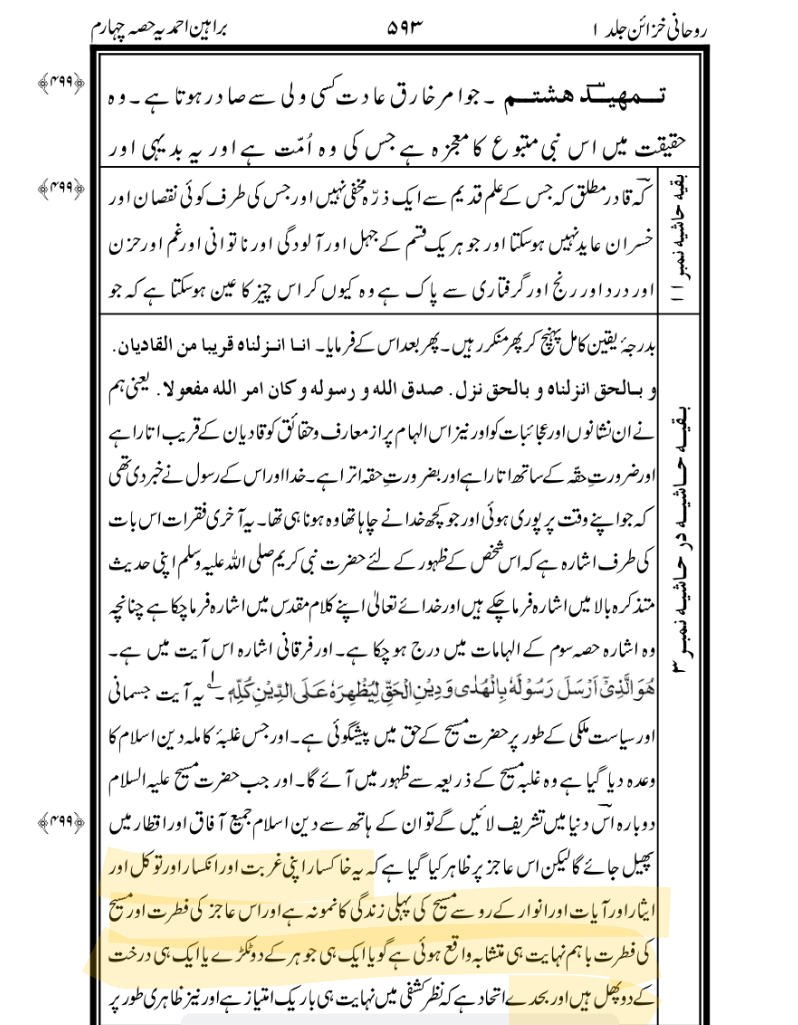

Here, Mirza Qadiani refers to this as a verse (ayat) and not his own revelation, as evident from his words: “This verse is a prophecy regarding Hazrat Isa (علیہ السلام).” He also defends the belief in the second coming of Isa (علیہ السلام).
Now, judge for yourselves: How can Mirza Sahib, in Ek Ghalti Ka Izala, claim this as his own revelation and use it to prove his messengership, when in Barahin-e-Ahmadiyya, he himself called it a Quranic verse and linked it to Hazrat Isa (علیہ السلام)?
Mirza Qadiani, while discussing another revelation جَرَى اللّٰهُ فِي حُلَلِ الْأَنْبِيَاءِ, writes in Barahin-e-Ahmadiyya:
“The meaning of this divine phrase is that the status of divine guidance and receiving revelation is originally the ‘garment of the prophets.’ Others receive it only as a loan. This ‘garment of the prophets’ is granted to some individuals of the Ummah of Muhammad (صلی اللہ علیہ وسلم) for the completion of deficiencies. This is also indicated in the saying of the Prophet (صلی اللہ علیہ وسلم):
عُلَمَاءُ أُمَّتِي كَأَنْبِيَاءِ بَنِي إِسْرَائِيلَ
(‘The scholars of my Ummah are like the prophets of Bani Israel.’)
Thus, although these individuals are not prophets, they are entrusted with the work of prophets.”
(Barahin-e-Ahmadiyya, Ruhani Khazain, Vol. 1, p. 601, footnote)
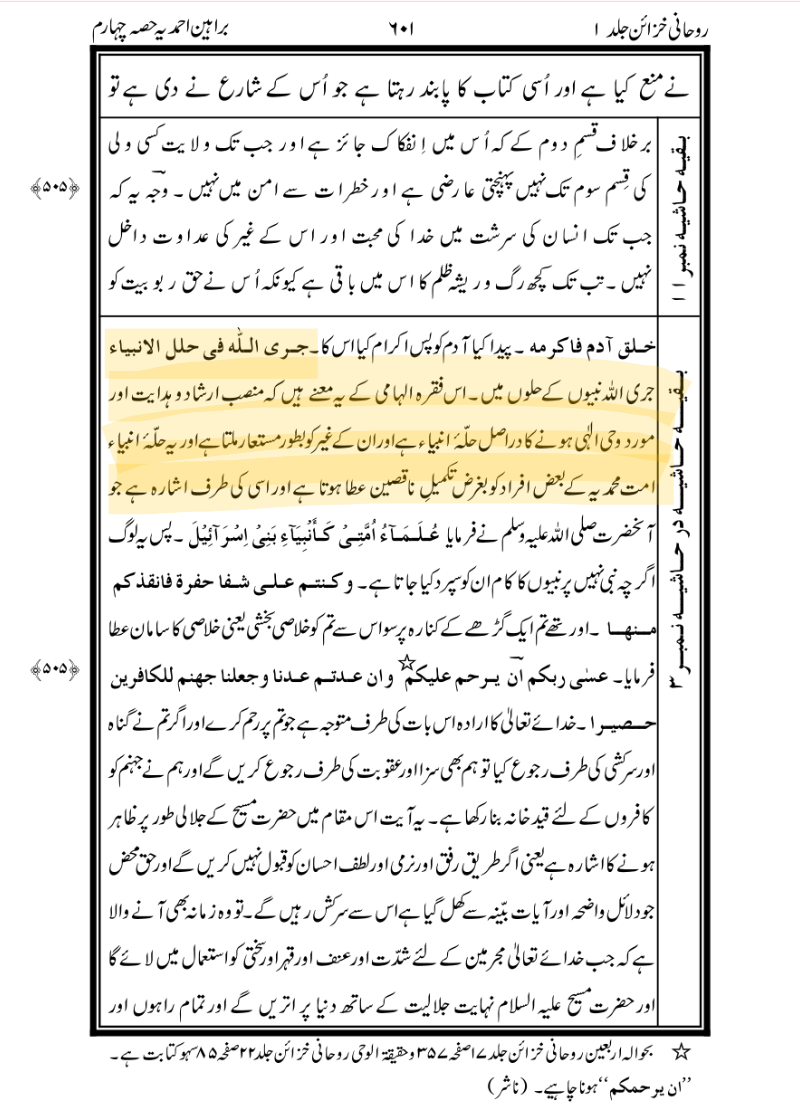
This explanation clearly shows that Mirza Sahib did not consider himself a prophet but rather a non-prophet who was given the work of prophets. He explicitly states: “These people, though not prophets, are entrusted with the work of prophets.”
Now, decide for yourselves: How can Mirza Sahib, in Ek Ghalti Ka Izala, distort his own words and falsely claim prophethood?
Dear readers! Regarding the revelation مُحَمَّدٌ رَّسُولُ اللّٰهِ وَالَّذِينَ مَعَهُ أَشِدَّاءُ عَلَى الْكُفَّارِ رُحَمَاءُ بَيْنَهُمْ, Mirza Qadiani explains in Barahin-e-Ahmadiyya:
“Muhammad is the Messenger of Allah, and those with him are harsh against the disbelievers and merciful among themselves. They are men whom neither trade nor sale distracts from the remembrance of Allah. May Allah bless the Muslims through them. Look at the signs of Allah’s mercy, and tell me if there are any like them, if you are truthful. Whoever seeks a religion other than Islam, it will never be accepted from him, and in the Hereafter, he will be among the losers.”
(Barahin-e-Ahmadiyya, Ruhani Khazain, Vol. 1, pp. 616-617, footnote)
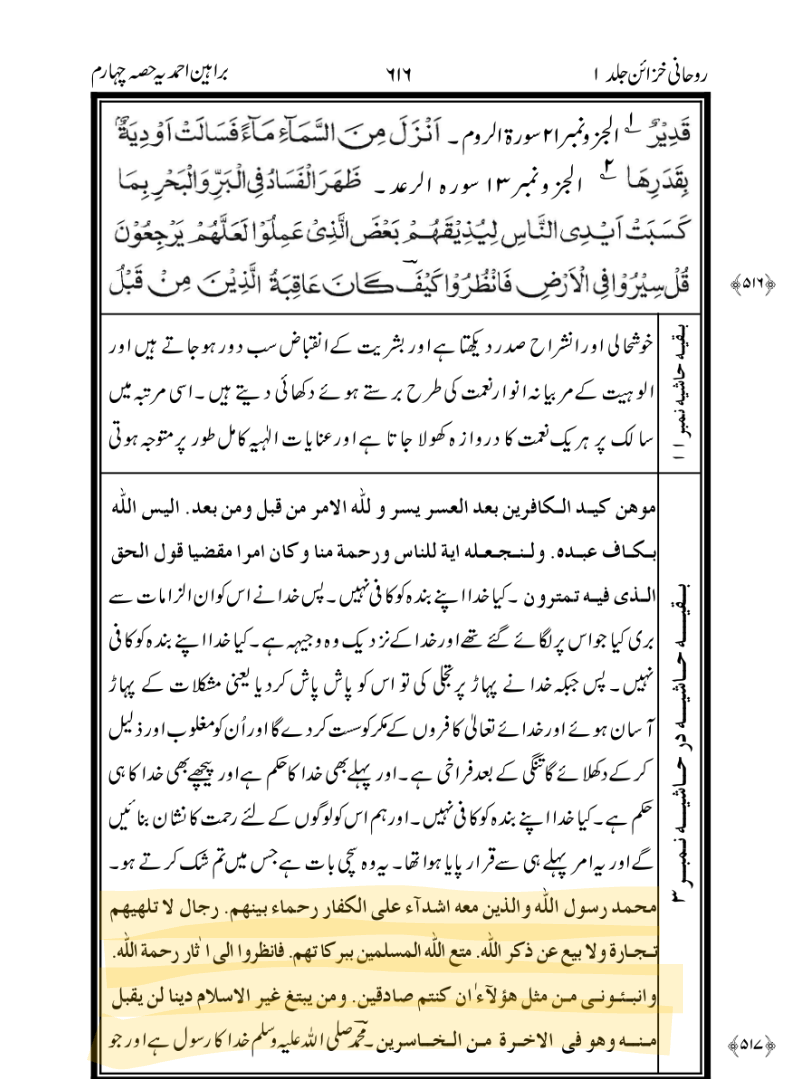
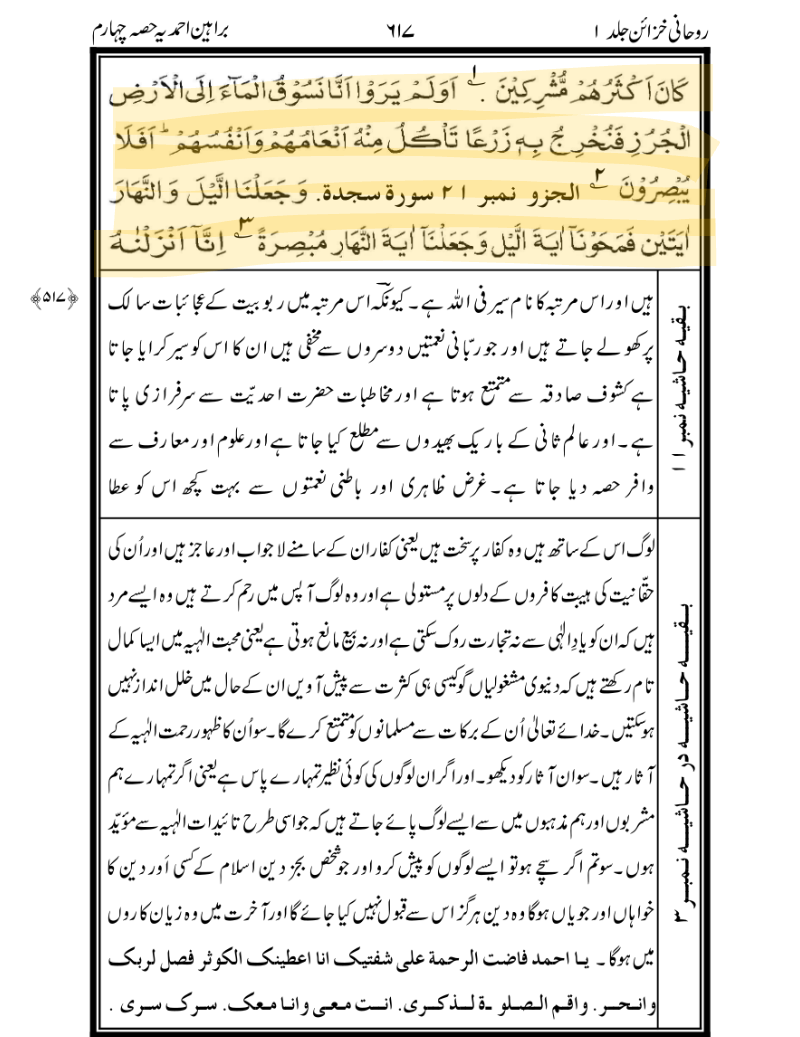
The chapter in which Mirza Qadiani recorded this revelation is titled “The Proofs from the Quran Regarding Its Truth and Superiority.” There is no indication in his explanation that he considered himself the Muhammad Rasoolullah mentioned in this revelation.
My respected Qadiani friends! My question to you is: If Mirza Sahib’s claim of prophethood was intended through these revelations, why did he not refute Maulana Muhammad Hussain Batalvi’s review at that time?
Now, let us further analyze Mirza Sahib’s revelation مُحَمَّدٌ رَّسُولُ اللّٰهِ وَالَّذِينَ مَعَهُ أَشِدَّاءُ عَلَى الْكُفَّارِ رُحَمَاءُ بَيْنَهُمْ.
The Quran itself states:
مُحَمَّدٌ رَّسُولُ اللَّهِ وَالَّذِينَ مَعَهُ أَشِدَّاءُ عَلَى الْكُفَّارِ رُحَمَاءُ بَيْنَهُمْ
In this verse, Muhammad Rasoolullah refers to the same Prophet Muhammad (صلی اللہ علیہ وسلم) whom we testify to in the Kalimah. If Mirza Sahib received a revelation in the same words and claimed that Muhammad Rasoolullah referred to himself, then tell me: When you recite the Kalimah, do you also consider Mirza Sahib as Muhammad Rasoolullah? If not, then why? Because Mirza Sahib himself claimed that, according to his revelation, he was Muhammad Rasoolullah.
If someone interprets Muhammad Rasoolullah in the Kalimah as referring to Mirza Sahib, would that not be blasphemy and disbelief?
Another question: Mirza Sahib also declared himself to be Isa ibn Maryam. Isa (علیہ السلام) was born without a father, while Prophet Muhammad’s (صلی اللہ علیہ وسلم) father’s name was Abdullah, and Mirza Sahib’s father’s name was Ghulam Murtaza. Thus, these three personalities are distinct. So, tell me: Was Mirza Sahib Ghulam Ahmad Qadiani, Muhammad Rasoolullah, or Isa ibn Maryam? If you say that he was spiritually all three, then I present further evidence:
Mirza Qadiani explicitly declared his existence to be that of Muhammad Rasoolullah (صلی اللہ علیہ وسلم).
Dear readers! Mirza Qadiani presented another revelation from Barahin-e-Ahmadiyya as proof of his prophethood:
“Then there is this divine revelation on p. 557 of Barahin-e-Ahmadiyya:
دُنْيَا مَعَ نَذِيرٌ آتٍ
(“A warner has come to the world”)
An alternative recitation is: دُنْيَا مَعَ نَبِيٌّ آتٍ
(“A prophet has come to the world”).”
(Ek Ghalti Ka Izala, Ruhani Khazain, Vol. 18, p. 207)

Allah says in the Quran:
وَمَا أَرْسَلْنَاكَ إِلَّا كَافَّةً لِّلنَّاسِ بَشِيرًا وَنَذِيرًا وَلَٰكِنَّ أَكْثَرَ النَّاسِ لَا يَعْلَمُونَ
(Saba 34:28)
“We have not sent you except as a bearer of glad tidings and a warner to all mankind, but most people do not know.”
This verse clearly shows that the Prophet (صلی اللہ علیہ وسلم) was sent as a warner (Nadhir) for all people until the Day of Judgment. If we accept another Nadhir after him, it implies that we do not fully believe in the Prophet’s (صلی اللہ علیہ وسلم) universal role as a warner, casting doubt on this Quranic verse.
My question to Qadianis is: By accepting Mirza Sahib as a Nadhir, do you doubt the Prophet’s (صلی اللہ علیہ وسلم) status as the universal warner, or do you not believe in the Quran, or are you unaware that the Prophet (صلی اللہ علیہ وسلم) was sent as a warner for all humanity?
Mirza Ghulam Ahmad Qadiani further writes in the same book:
“Wherever I have denied prophethood, it was only in the sense that I am not an independent law-bearing prophet. However, in the sense that I have received spiritual blessings through my following of the Prophet (صلی اللہ علیہ وسلم) and have been given knowledge of the unseen by Allah, I am a prophet and messenger—but without a new Shariah. I have never denied being a prophet in this sense. Rather, Allah Himself has called me a Nabi and Rasul in these meanings. My statement ‘I am neither a prophet nor the recipient of a book’ only means that I am not a law-bearing prophet.”
(Ek Ghalti Ka Izala, Ruhani Khazain, Vol. 18, pp. 210-211)
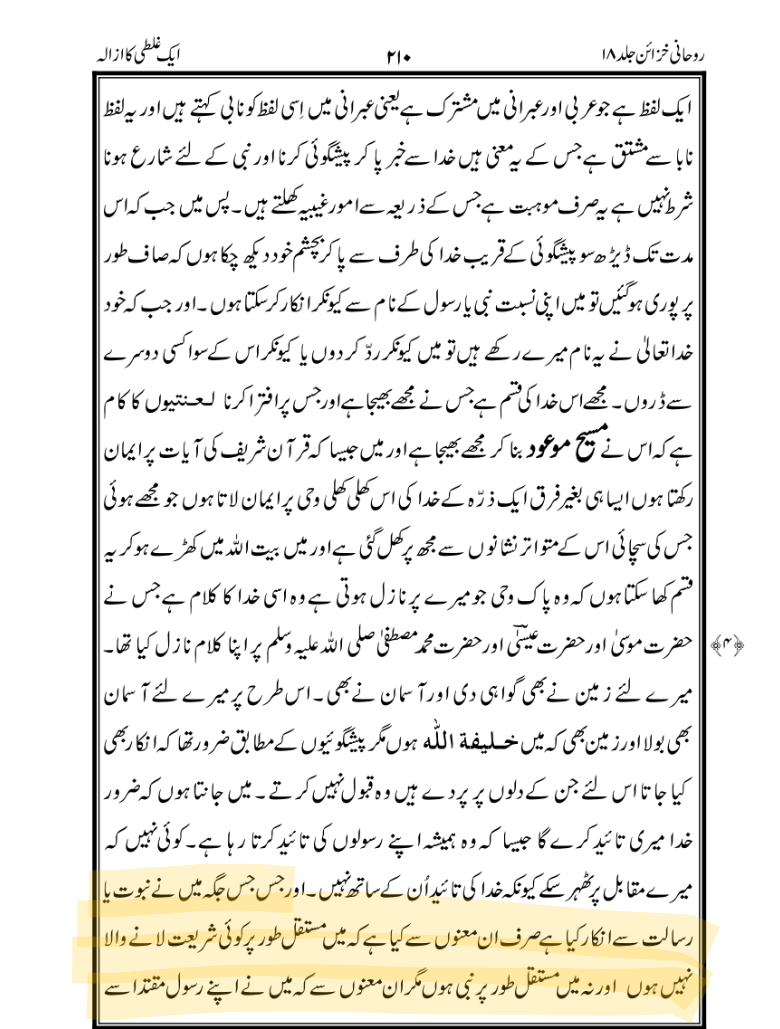
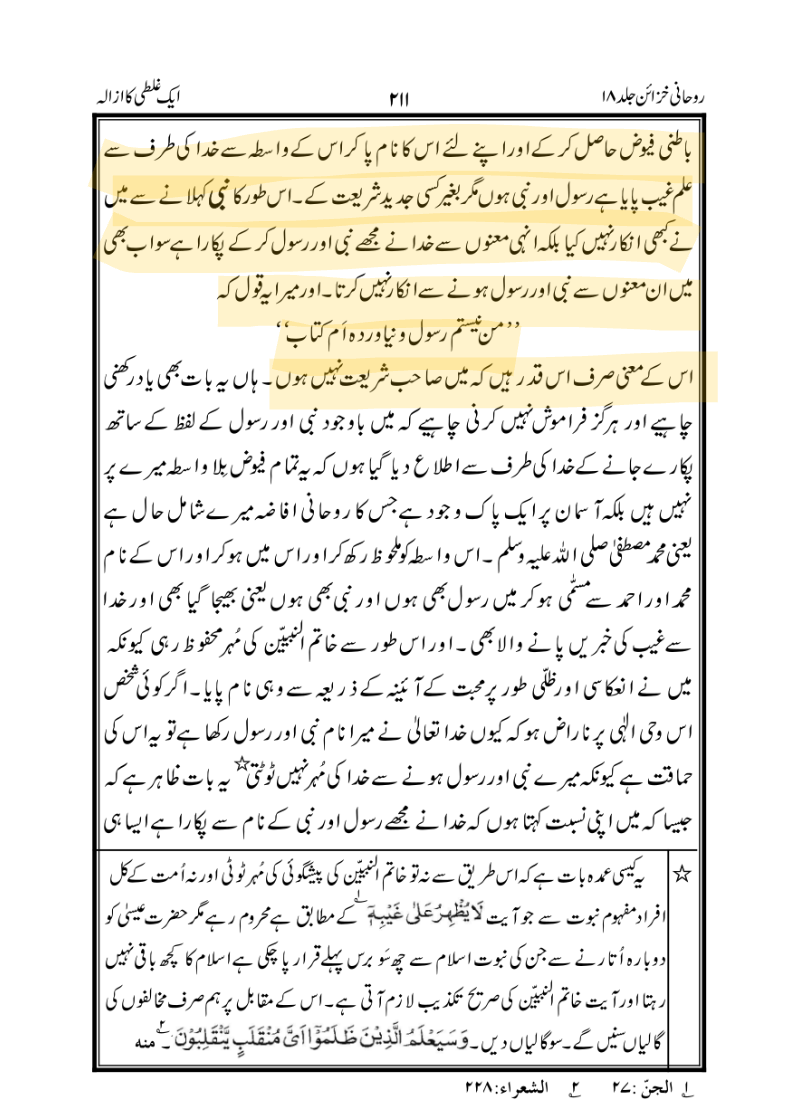
Here, Mirza Sahib engages in clear deception. None of his earlier statements show that he only denied being an independent law-bearing prophet. Instead, his earlier writings prove his absolute denial of prophethood, where he even described the nature of his revelation as wahy-e-wilayat (revelation of sainthood) and not wahy-e-nubuwwat (prophetic revelation).
My position is further supported by the statements of Bashiruddin Mahmud and Maulvi Sarwar Shah:
Bashiruddin Mahmud, the second Khalifa of the Qadianis and Muslih Maud, writes in Haqeeqat-un-Nubuwwat:
“We first discussed whether Hazrat Masih Maud’s belief regarding prophethood remained consistent or changed over time. By Allah’s grace, we have proven that this belief changed after 1900. The last book in which the earlier belief was expressed was Tiryāq-ul-Qulūb, written in 1899 but published in 1902 due to some obstacles.”
(Haqeeqat-un-Nubuwwat, Part 1, Ruhani Khazain, Vol. 2, p. 398)
Bashiruddin Mahmud writes in Al-Fazl newspaper:
“A study of Hazrat Masih Maud’s books shows that just as his belief regarding the life and death of Hazrat Isa (علیہ السلام) changed (i.e., he initially believed Isa (علیہ السلام) was alive and later declared him dead), similarly, his views on his own prophethood also evolved. Initially, he did not consider himself a prophet, but later he began to believe he was one. The inevitable conclusion is that his earlier writings show he did not claim prophethood, while his later writings prove he did. Our research confirms that Hazrat Masih Maud changed his stance on prophethood around 1901, and this change is so clear that there is no room for doubt.”
(Haqeeqat-ul-Wahi, Ruhani Khazain, Vol. 22, p. 153)
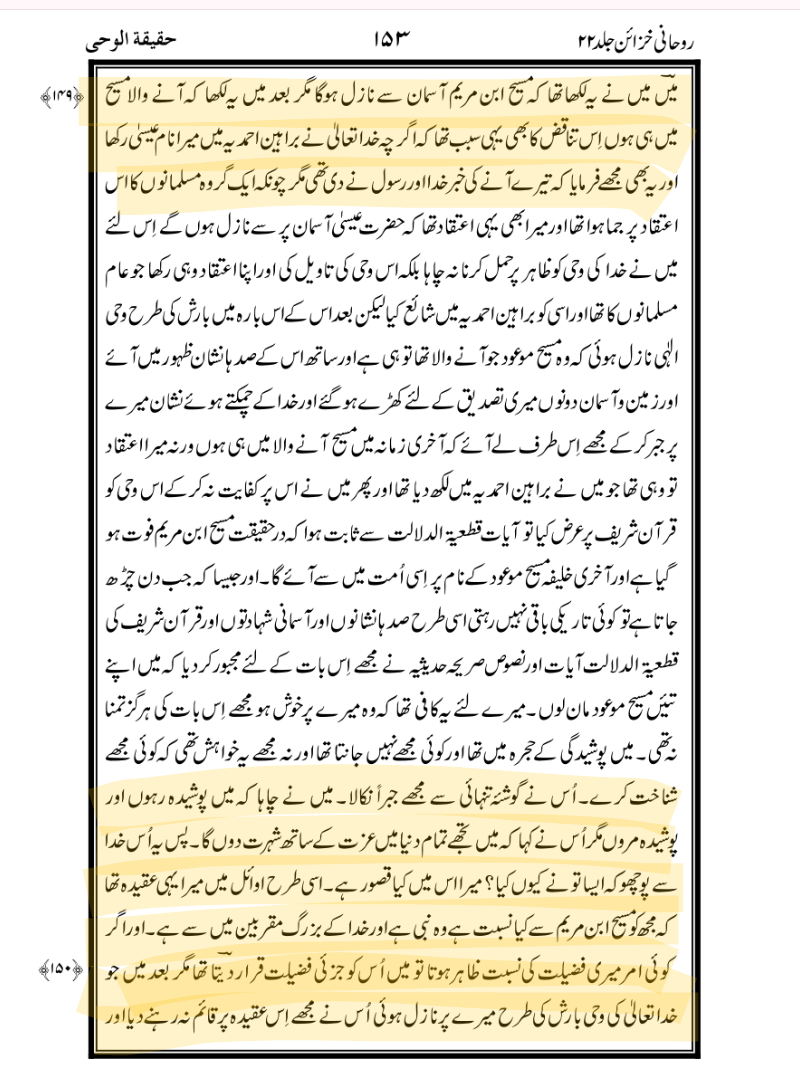
Maulana Muhammad Hussain Batalvi (رحمة اللہ علیہ) writes:
“Our research and experience confirm that these objections (whether religious or political) are based entirely on misunderstanding or deliberate deception. Apart from the claim of divine revelation, all accusations against the author are baseless. The author neither claims prophethood nor the attainment of the exclusive qualities of the prophets.”
(Isha’at-us-Sunnah, Vol. 7, No. 6, p. 175)
Maulana Batalvi further writes:
“The essence of the second group’s argument is that the author of Barahin-e-Ahmadiyya has presented himself as the recipient of many Quranic verses (which were originally addressed to Hazrat Muhammad (صلی اللہ علیہ وسلم), Adam, Isa, and Ibrahim (علیہم السلام)) and has claimed the qualities exclusive to prophets (such as the obligation of following him, the descent of the Quran, receiving revelation, the conquest of Makkah, the Hawd-e-Kawthar, being raised alive to the heavens, etc.). This suggests that the author of Barahin-e-Ahmadiyya claims prophethood. There are two answers to this: First, the author never claimed that these Quranic verses were revealed to him or that the addresses to the prophets in the Quran or earlier scriptures were meant for him. Nor did he claim to possess the exclusive qualities of the prophets. By Allah! The author never made such claims in this book or outside it. He firmly and clearly believes that the addresses in these verses are directed to the prophets themselves, and the qualities mentioned belong exclusively to them. When he claims to have received these verses as revelations, he means that Allah has honored him by addressing him with the same words used for the prophets, but with different meanings—meanings that are shadows or reflections of the original.”
(Isha’at-us-Sunnah, Vol. 7, No. 7, pp. 218-219)
Maulana Batalvi adds:
“In short, the author does not claim to have received the Quran as it is known among Muslims, nor does he claim the exclusive qualities of the prophets. The revelations he claims to have received are not the Quran in terms of their addressee, nor are they exclusive to prophets.”
My question to Qadianis is: If Mirza Sahib’s claim of prophethood was intended through these revelations, why did he not refute Maulana Batalvi’s review at that time?